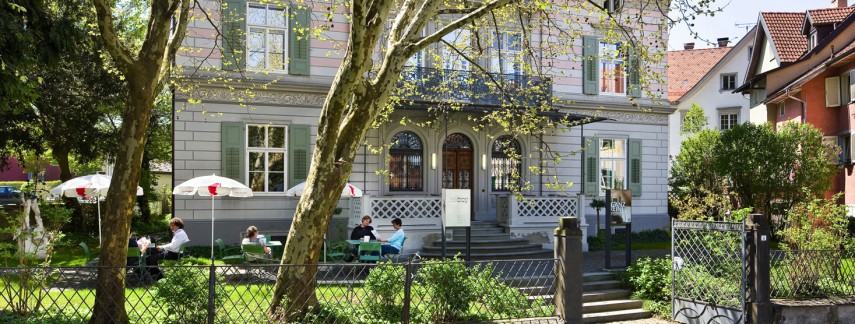Literatur transformiert die Welt durch Sprache, zeigt Widersprüche auf, macht das Wesentliche kenntlich, greifbar, manchmal sogar begreifbar. Drei jungen Autorinnen – Yasmin Hafedh, Ina Ricarda Kolck-Thudt und Maya Rinderer – gelingt dies auf eine originelle und unmittelbare Weise, mit Einfühlungsvermögen und voller Anteilnahme. Sie schreiben über die gesellschaftlichen Krisen und Umbrüche, die wir gerade erleben, über Politik und Persönliches, Geschichte und Gegenwart, gehen der Mehrfachbedeutung von Worten und Zuschreibungen auf den Grund oder reflektieren scheinbar salopp, dabei aber sehr tiefsinnig, über die Welt durch Slam-Poetry oder fragen sich, was die Flüchtlinge, die heute nach Europa kommen, mit ihnen selbst und den eigenen Familiengeschichten zu tun haben.
Die drei Autorinnen sind in Österreich geboren, haben aber alle einen Migrationshintergrund in zweiter Generation (Tunesien, Rumänien, Israel), und dass die Lesung am 10. Dezember, dem Tag der Menschenrechte, stattfindet, ist kein Zufall.
Yasmin Hafedh, a.k.a. Yasmo, wurde 1990 in Wien geboren. Sie ist eine österreichische Bühnenpoetin, Autorin und Rapperin. Sie studiert Theater-, Film- und Medienwissenschaft an der Universität Wien. Yasmin Hafedh schreibt seitdem sie Denken kann. Seit 2007 ist sie Kolumnistin bei der Literaturzeitschrift “& Radieschen”, 2013 war sie mit “Bonustrack” Kolumnistin bei der feministischen Zeitschrift “an.schläge”. Weiters veröffentlicht sie in Literaturanthologien und -zeitschriften. Hafedh ist erfolgreiche Slam-Poetin, Spoken-Word-Künstlerin und Rapperin und als solche bereits auf zahlreichen internationalen Bühnen aufgetreten, hat an Poetry Slams teilgenommen, Schreibworkshops an Universitäten und Deutsch-Instituten geleitet und Soloshows gespielt.
Sie hat in Düsseldorf 2009 als erste Österreicherin bei der deutschsprachigen Poetry Slam Meisterschaft den Meistertitel in der Kategorie U20 geholt, 2013 als erste Frau den Titel der österreichischen Meisterin erlangt.
Ina Ricarda Kolck-Thudt wurde 1992 in Feldbach geboren und wuchs in Amstetten auf. Nach der Matura 2011 studierte sie Sprachkunst an der Universität für angewandte Kunst Wien (Abschluss 2015) und begann 2014 mit dem Studium der Romanistik an der Universität Wien. Veröffentlichungen im „Augustin“, der Wiener Straßenzeitung, in „Jenny“, der Anthologie des Instituts für Sprachkunst und in der „Zwischenwelt“.
Maya Rinder wurde 1996 in Dornbirn geboren, wuchs zweisprachig auf (Hebräisch und Deutsch), 2014 Matura am Bundesgymnasium Dornbirn. Teilnahme an Workshops von Literatur Vorarlberg und der Jugendliteraturwerkstatt Graz. Ab Herbst 2015 Studium der Orientalistik an der Universität Wien.
Preise (Auswahl): Jurypreis des Irseer Pegasus (2012), Preisträgerin des Hildesheimer Lyrik-Wettbewerbs, Arbeitsstipendium des Landes Vorarlberg (2013), Aufenthaltsstipendium des Landes Vorarlberg in Paliano, Italien (2014).
Esther, Roman 2011, Bucher Verlag; Sommerferienkrieg, Hörspiel im ORF; An alle Variablen, Lyrikband 2013, Bucher Verlag; Die Bienen fliegen, Theaterstück 2014, Theater Kosmos; Veröffentlichungen in Literaturzeitschriften und Feuilletons (z.B. Zwischenwelt, miromente, Spectrum).
Vladimir Vertlib, geboren in Leningrad (heute St. Petersburg), lebt heute nach Zwischenstationen in Wien und Israel, den Niederlanden, Italien und den USA in Salzburg. In seinen Romanen setzt er sich mit Migration und Identität auseinander, mit Existenzen zwischen den Welten.

